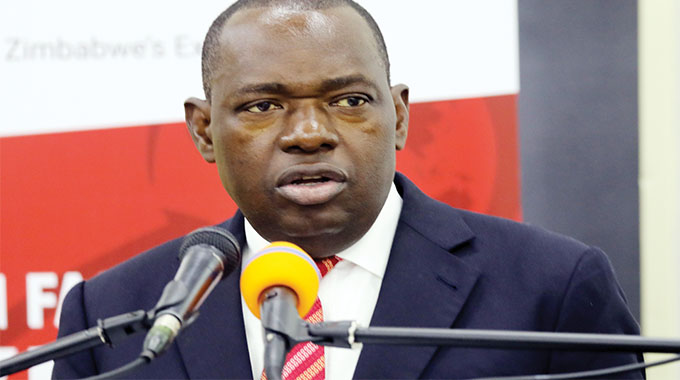EDITORIAL COMMENT: Sanctions scuttling efforts to revive economy

REPORTS that illegal sanctions imposed on Zimbabwe by the West in the past two decades have cost the country more than US$70 billion in lost revenue and lines of credit are staggering and should enjoin the international community to seriously consider lifting the punitive measures to give the New Dispensation breathing space to resuscitate the economy.
While the mantra from Western capitals and their local surrogates in the opposition has always been that the sanctions are targeted at a few individuals in the ruling Zanu-PF party and Government, revelations by the Minister of Foreign Affairs and International Trade, Dr Sibusiso Moyo, who told the Parliamentary Portfolio Committee on Foreign Affairs and International Trade on Monday that the embargo on Zimbabwe is curtailing efforts to revive the economy, are instructive.
Briefing the Committee on his Ministry’s programmes and activities, Dr Moyo said Zimbabwe continues to deal with the illegal sanctions imposed by some Western countries which have negatively affected the most vulnerable groups of citizens in particular, and the economy in general.
“It is estimated, for those who have done the studies, that Zimbabwe has lost an estimated US$42 billion in revenue because of the sanctions,’’ said Minister Moyo.
“The country lost multi-lateral donor support which is estimated at about US$4,5 billion annually since 2001 and US$12 billion in IMF, World Bank and African Development Bank loans which could have developed infrastructure in this country and commercial loans estimated at US$18 billion which could have gone to the private sector and into other areas and as a result of that, a reduction of GDP of over US$21 billion .
“Now that’s a picture of what has been the impact of the sanctions in the past two decade.” Minister Moyo said the heavy cost to the economy has necessitated Zimbabwe’s policy thrust of re-engagement to ensure the country returns to the community of nations.
“This is the main reason why our foreign policy at the moment targets at re-engagement with those countries who have seen us in a negative way and who should therefore unlock this particular area.
That’s why since his inauguration, His Excellency (President Mnangagwa) has dynamised Zimbabwe’s quest to normalise relations with the West through re-engagement.
Serious and focused dialogue has already been initiated with key constituent countries among them the United Kingdom, the US, Germany, France, Sweden and Australia.
“The main objective of the re-engagement is to normalise all aspects of the country’s relations by ending Zimbabwe’s isolation and re-opening all lines of communication.
The engagement with the EU, until the advent of the Second Republic, the EU refused to recognise the legitimacy of the outcomes of any election accusing (the) Zimbabwe Government of vote rigging and human rights abuses.
“However, the new dispensation has enabled the thawing of relations with the EU as seen by their observance of the July 31 elections and continued exchange of high level visits,” said Minister Moyo.
The revelations by Dr Moyo should alarm Zimbabweans as they put into perspective the immense cost of sanctions on Zimbabwe’s economy.
Under President Mnangagwa, the Second Republic has prioritised the normalisation of relations with the West through an aggressive re-engagement drive.
The Government has also instituted far reaching reforms which include opening up the democratic space by repealing repressive laws such as the Public Order and Security Act, Access to Information and Protection of Privacy Act and other pieces of legislation which impede the ease of doing business.
The reform agenda, which is ongoing, has begun to bear fruit with investors flocking into the country to scout for opportunities.
On the economic front, Government has amended indigenisation laws, scrapping the 51 percent requirement for indigenous ownership of businesses; promulgated laws to enhance the ease of doing business and implemented the Transitional Stabilisation Programme — a short term blueprint anchoring its much vaunted Vision 2030.
It’s on course in its International Monetary Fund Staff Monitored Programme and has performed miracles in achieving a budget surplus and containing expenditure.
Despite notching all these milestones and bending over backwards to accommodate most of the West’s prescriptions, there has been very little acknowledgement of progress made particularly from the United States which has maintained a hardline stance.
We are aware of Washington’s recent praise of the TSP milestones but that doesn’t go far enough in appreciating the giant strides made by the New Dispensation which has put a distance between itself and the First Republic.
On a brighter note, we welcome the European Union’s continued engagement with Harare at various levels. Since observing the July 31 harmonised elections, the EU launched a dialogue with Zimbabwe in May this year as a sign of improving ties.
We also note and acknowledge the visit by a Commonwealth assessment team which was in the country a fortnight ago and hope that they were satisfied with progress Zimbabwe has made since the advent of the New Dispensation.
Since Harare has applied to rejoin the club of former British colonies as part of its re-engagement drive, we hope its application will be given due consideration.









Comments